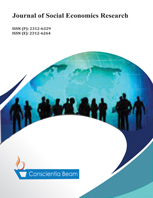Effect of petrol subsidy removal on government income, cost of living, consumption patterns, savings and investment, and SMEs performance
DOI:
https://doi.org/10.18488/35.v11i3.3774Abstract
The purpose of this study is to examine the effect of petrol subsidy removal on government income, cost of living, consumption patterns, savings and investment, and SMEs performance. The study adopted a survey research design, and the population comprised government officials, SME operators, and individual households in the state capital metropolis of the North Central states in Nigeria. We used a convenient sampling technique to select the respondents from a sample size of 483. The study used a questionnaire to collect data, and SmartPLS used partial least squares structural equation modeling for analysis. The study found that petroleum subsidies have a negative and significant effect on consumption patterns, the cost of living, savings and investment, and SME performance. However, it has a positive and significant effect on government income. The study also found that government income and SMEs performance have a positive and significant effect on living standards among people in north-central Nigeria. The study emphasises the need for well-calibrated strategies to minimise the socioeconomic effects of the government's petrol subsidy removal policy. Targeted social safety nets, poverty reduction programmes, and alternative energy investment must balance budgetary sustainability and citizen well-being. SMEs must adjust to changing customer behaviour, and individuals must be encouraged to make smart financial decisions to counterbalance petrol subsidy removal.

